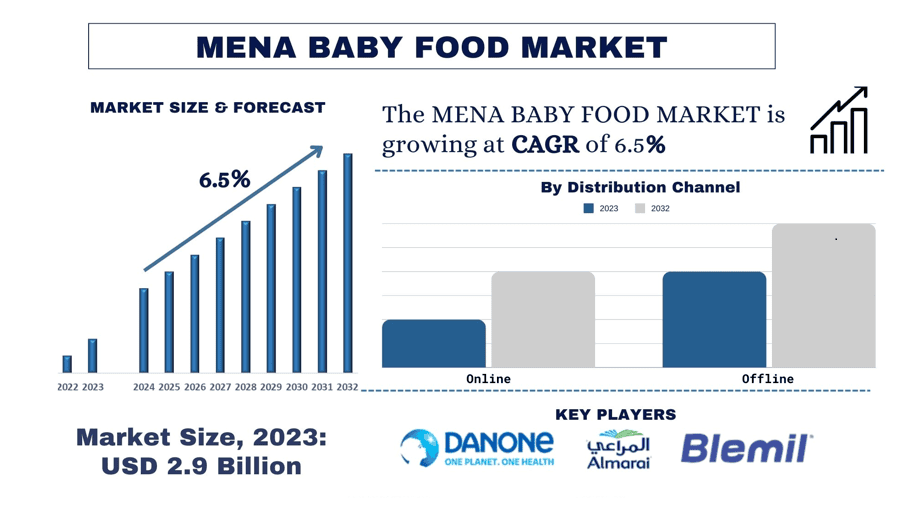MENA Baby Food Market Report, size, Demands, Trends, Analysis and Forecast 2032

As per their “MENA Baby Food Market” report, the MENA market was valued at USD 2.9 billion in 2023, growing at a CAGR of 6.5% during the forecast period from 2024 - 2032 to reach USD billion by 2030.
Saudi Arabia, a land of rich traditions and heritage, is witnessing a significant shift in the way parents approach the nutrition of their infants. Baby Food, once a niche market, is gaining momentum in the kingdom. In this article, we delve into the world of Baby Food in Saudi Arabia, exploring the factors driving its popularity, government regulations, and the positive impact it is having on the health and well-being of the nation's youngest generation.
The demand for Baby Food in Saudi Arabia can be attributed to several key factors:
Safety and Purity: Parents in Saudi Arabia, like elsewhere in the world, are increasingly concerned about the safety and purity of the food they feed their infants. Baby Food is perceived as a safer choice as it is free from synthetic pesticides, harmful chemicals, and genetically modified organisms.
Nutritional Excellence: Baby Food is often considered more nutritious. It is believed to contain higher levels of essential vitamins, minerals, and antioxidants, providing infants with the best possible start in terms of nutrition.
Environmental Consciousness: Saudi consumers are becoming more environmentally conscious. Baby Food aligns with this mindset as it is produced with a focus on eco-friendly and sustainable practices.
Government Support: The Saudi government has recognized the importance of promoting healthier nutrition, especially among infants and young children. They have implemented regulations to ensure the safety and quality of Baby Food products.
Government Regulations on Baby Food in Saudi Arabia
The Saudi Food and Drug Authority (SFDA) plays a pivotal role in regulating the production and distribution of Baby Food in the kingdom. Here are some key government regulations:
Access sample report (including graphs, charts, and figures): https://univdatos.com/reports/mena-baby-food-market?popup=report-enquiry
Certification: Baby Food products must be certified as organic by recognized certification bodies. These bodies ensure that products meet stringent standards, including the use of organic ingredients and environmentally friendly production methods.
Labeling: The SFDA mandates clear and accurate labeling of Baby Food products. Labels must indicate that the product is "organic" and provide information on the certification authority.
Quality Control: The SFDA conducts regular quality control inspections of Baby Food production facilities to ensure compliance with safety and quality standards. Any violations can result in fines or product recalls.
Import Regulations: For imported Baby Food products, the SFDA enforces strict import regulations. Imported products must meet Saudi organic standards and undergo thorough inspections before entering the market.
Nutritional Guidelines: The SFDA provides nutritional guidelines for baby food products, including organic options. These guidelines ensure that products meet the nutritional needs of infants and young children.
Click here to view the Report Description & TOC: https://univdatos.com/reports/mena-baby-food-market
Conclusion
In Saudi Arabia, the rise of Baby Food reflects a growing commitment to providing the best possible nutrition for the nation's youngest generation. Government regulations, led by the Saudi Food and Drug Authority, play a crucial role in ensuring the safety and quality of Baby Food products. As the kingdom embraces Baby Food, parents are empowered to make informed choices about their children's diets, with the assurance that these products are safer, more nutritious, and aligned with their environmental values. In a country where traditions run deep, the Baby Food phenomenon is nurturing a healthier and more conscious generation from the very beginning of their journey in life. According to the UnivDatos, the growing awareness of organic food in the region will drive the scenario of Baby Food and as per their “MENA Baby Food Market” report, the MENA market was valued at USD 2.9 billion in 2023, growing at a CAGR of 6.5% during the forecast period from 2024 - 2032 to reach USD XX billion by 2030.
Contact Us:
UnivDatos
Email: contact@univdatos.com
Contact no: +1 978 733 0253
Website: www.univdatos.com
- Questions and Answers
- Opinion
- Motivational and Inspiring Story
- Technology
- True & Inspiring Quotes
- Live and Let live
- Focus
- Geopolitics
- Military-Arms/Equipment
- Art
- Causes
- Crafts
- Dance
- Drinks
- Film/Movie
- Fitness
- Food
- Jeux
- Gardening
- Health
- Domicile
- Literature
- Music
- Networking
- Autre
- Party
- Religion
- Shopping
- Sports
- Theater
- Wellness
- News
- Culture

